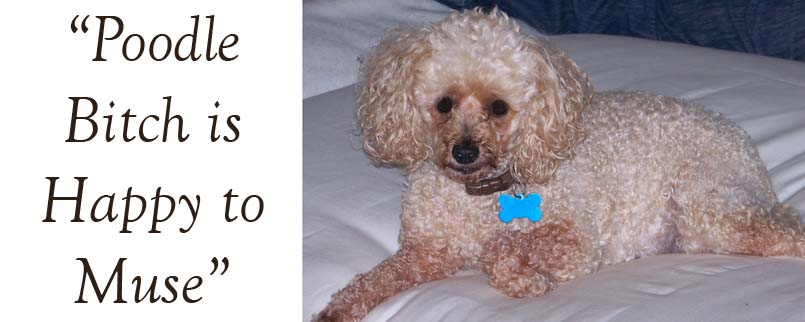Naturally, Poodle Bitch was intrigued. For that reason, she took a few moments to come out from under the bed to read the article accompanying the eye-catching headline.
Poodle Bitch was disappointed by what she saw. Oh, it started promisingly enough:
What's in a bark? A new study suggests that 6-month-old babies know the answer.
A study, Poodle Bitch thought. A study that suggests that 6-month-old (human) babies can tell what dog barks mean. It sounds so scientific. It sounds as if new frontiers in human-canine communication are opening before Poodle Bitch's very eyes.
Then came the second paragraph:
Researchers found that most infants who were tested could figure out that an aggressive bark goes with an angry-looking dog. They also seemed to know that friendly-looking pooches voice their feelings in a different way.
Ah, Poodle Bitch began to note the subtle shift in the language employed by the author of the article. "[M]ost infants." "They also seemed to know."
Suddenly, Poodle Bitch was wondering why she bothered to come out from under the bed. Her gaze became much more harsh. And just a few paragraphs later, she was feeling downright misled by that eye-catching headline:
The researchers showed the (128) babies video stills of aggressive and non-aggressive dogs, and watched what they did when they heard sounds of barking.
...
The researchers believe that they can glean whether a baby is making a connection between two things by monitoring how long they look at a picture. In this case, 6-month-old babies were more likely to look longer at the picture of a canine expression that matched the bark.
Only about 15 percent of the babies spent more time looking at the wrong dog picture or looked equally at both, Flom said.
Just so Poodle Bitch is absolutely clear on this: The article's headline declares that (human) babies can understand the language of dogs. The reason for this bold declaration is that "about" 85% of the 128 babies in the study let their infantile gaze linger for a few seconds longer on one picture than another.
Poodle Bitch would like to see the pictures. Did these small, newly-formed human specimens have a choice between a picture of a poodle and, say, well- any other breed? Because, frankly, Poodle Bitch believes that would unfair.
Poodle Bitch would like to hear the sounds to which these tiny volunteers were subjected. Did they hear the dulcet tones of the poodle's announcement of her desire for food, or to be let out for her walk? Or did they have to suffer through the harsh and bothersome bark of the- well, any other breed?
If only these researchers had bothered to consult with Poodle Bitch, she would have been only too glad to reveal to them the only message that truly sophisticated canines have for human babies:
"Stay away from me."

This ridiculous non-story with its misleading headline about a half-hearted "study" earns nothing but a raspberry from Poodle Bitch.



